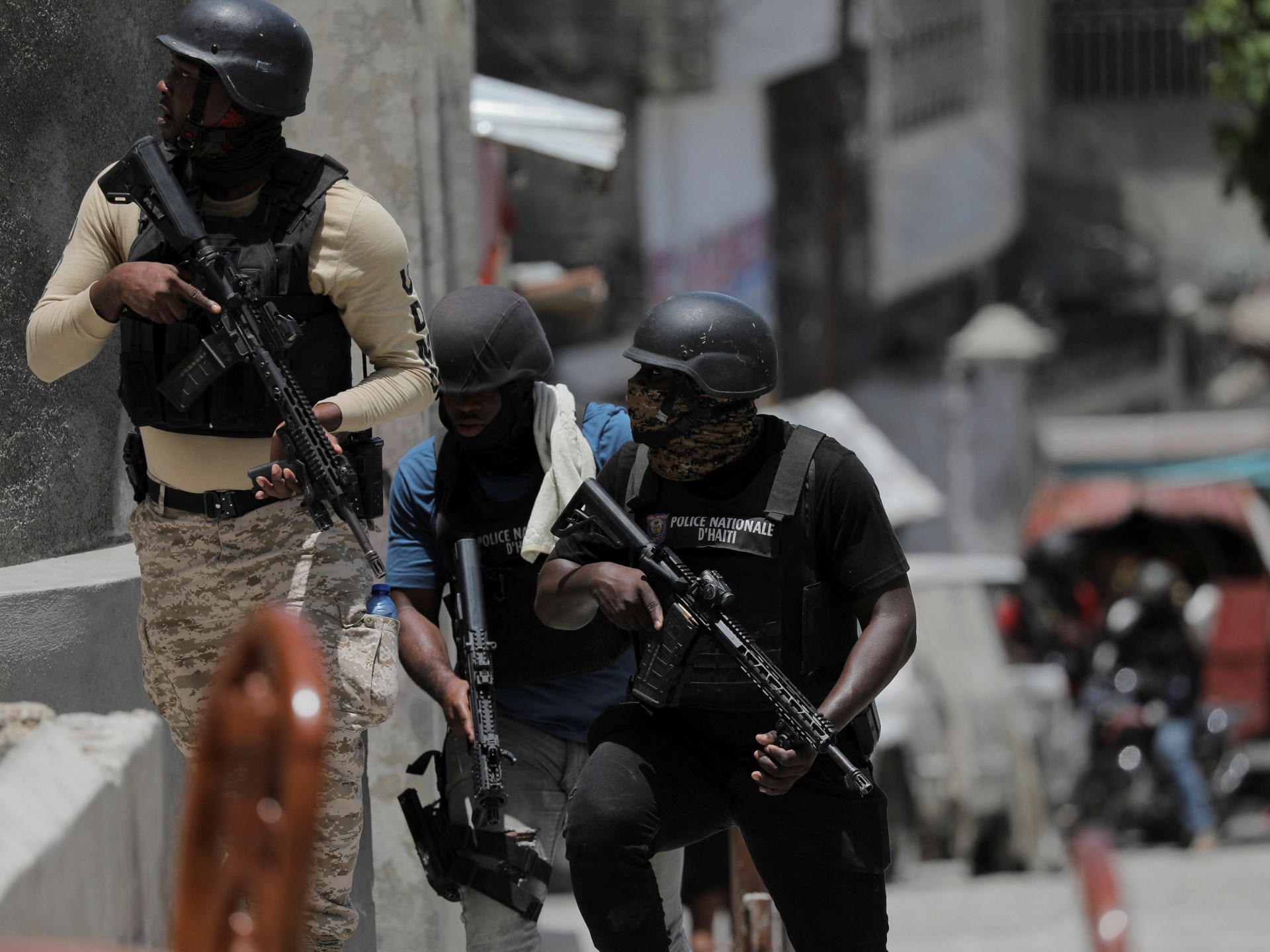Police officers in Haiti trying to protect citizens who fled a neighborhood controlled by gangs (Reuters)
The capital of Haiti, Port-au-Prince, is still mired in gang-related violence, and while the United States and Germany announced the evacuation of employees from their embassies, international institutions warned of the deteriorating humanitarian conditions.
Criminal gangs control most of the capital, as well as the roads leading to the rest of the country, and have been attacking police stations, prisons and courts for days, in the absence of Prime Minister Ariel Henry, whom the gangs, like part of the population, are demanding to resign.
According to the latest news, Henry was stranded in Puerto Rico after a trip abroad.
In the face of violence, dozens of residents took refuge in the headquarters of public administrations in the capital, hoping to seek refuge there.
Armed men attacked the presidential palace and the capital police headquarters, according to what the General Coordinator of the National Police Union confirmed to Agence France-Presse, confirming that a number of the attackers were killed.
Tight security measures around the US Embassy in Port-au-Prince (Reuters)
Evacuation of embassies
The US embassy said on the X website, “The increase in gang violence in the vicinity of the US embassy and the airport has prompted the State Department to make arrangements to allow the departure of additional employees at the embassy.”
The operation, led by the US Army, took place on Sunday night using helicopters, according to witnesses at the scene.
A US State Department spokesman said that the embassy is “open for limited operations” with a reduction in the number of its staff.
In the same context, the German Ambassador and Permanent Representative in Port-au-Prince left for the Dominican Republic with representatives of the European Union delegation, adding that they would work from the Dominican Republic “until further notice.”
The Director of the International Organization for Migration's mission in Haiti, Philippe Branchat, warned on Saturday that the capital's residents live in isolation and have nowhere to go, stressing that "the city is under siege."
He added that people who flee are unable to contact their family members and friends who are in the rest of the country in search of refuge, as the capital is surrounded by armed groups and dangers.
According to the International Organization for Migration, there are 362,000 displaced people - more than half of whom are children - currently in Haiti, an increase of 15% since the beginning of the year.
In the face of the violence, the Caribbean Group of Nations (CARICOM) invited representatives of the United States, France, Canada and the United Nations to a meeting on Monday in Jamaica, to discuss the violence and how to provide assistance to Haiti.
US State Department spokesman Matthew Miller announced on Saturday that US Secretary of State Anthony Blinken recently spoke with Kenyan President William Ruto, and noted that the two men stressed their firm commitment to deploying the multinational security support mission.
Gang attacks in Haiti forced thousands to flee for their lives (French)
Desperate hunger
Meanwhile, departments and schools were closed, the airport and port operations were disrupted, and obtaining care became difficult after “hospitals were attacked by gangs, and were forced to evacuate medical staff and patients, including newborns,” according to the International Organization for Migration.
Director General of the National Ports Authority, Jocelin Villiers, reported looting at the port.
The non-governmental organization Mercy Corps has warned of the risks threatening the supplies of the population of the poorest country in the Americas.
“With the closure of the international airport, the little aid currently provided to Haiti may no longer arrive,” she said, adding, “If we no longer have access to these containers, Haiti will soon suffer from hunger.”
In turn, several United Nations representatives in Haiti warned that “if paralysis continues in the Port-au-Prince metropolitan area over the coming weeks, approximately 3,000 pregnant women are at risk of not being able to access basic health care.”
The United Nations Humanitarian Coordinator in the country, Ulrika Richardson, said that "a very large number of women and young women in Haiti are victims of indiscriminate violence committed by armed gangs," stressing that the international organization "is committed to continuing to provide assistance to them."
Source: French

